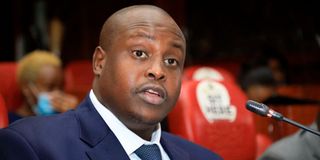MPs seek details on Sh8.6 billion fuel levy from energy regulator

Energy and Petroleum Regulatory Authority (Epra) Director-General Daniel Kiptoo when he appeared before the National Assembly Committee on Finance and Planning on September 28, 2021.
The energy regulator is under pressure to reveal details of a multibillion-shilling fund intended to cushion Kenyans from high fuel prices.
Energy and Petroleum Regulatory Authority (Epra) Director-General, Daniel Kiptoo, yesterday told lawmakers that the Treasury released Sh8.6 billion from the Petroleum Development Levy Fund to stabilise fuel prices between April and August, before it was withdrawn in this month’s review that saw prices shoot up.
Mr Kiptoo, who was summoned by the National Assembly Finance and Planning Committee to explain the steep price increases, refused to disclose how much is left in the kitty and why the subsidy was withdrawn.
The National Treasury has been drawing from the kitty to compensate marketers after Epra cut their margins, which kept diesel and kerosene prices at Sh107.66 and Sh97.85 per litre respectively between June and August.
The price of petrol was capped at Sh127.14 in the same period.
“My quick calculations from the monthly fuel consumption figures you have given show that the Fund should have had more money left at the time the subsidy was discontinued,” Homa Bay Woman Representative and committee chairperson, Gladys Wanga, told Mr Kiptoo.
“Explain why the subsidy was withdrawn yet the Fund was not exhausted.”
Contribution to the Fund was increased to Sh5.40 per litre on petrol and diesel from Sh0.40 last year.
The money is to be to be used on the development of the petroleum industry and stabilising fuel prices.
“The stabilisation of petroleum products is a policy matter. I do not know why the subsidy was discontinued. The right person to answer that is the Treasury Cabinet Secretary,” Mr Kiptoo said.
The Epra boss appeared before the committee alongside Kenya Pipeline Company (KPC) Managing Director, Macharia Irungu.
Mr Kiptoo said the high fuel costs are due to increased landed costs since October last year following a rise in international demand for crude.
He said the average landed cost of petrol has shot up by 66.57 per cent to Sh60.35 from Sh36.23 per litre from October 2020.
That of diesel, Mr Kiptoo told the parliamentarians, has increased by 58.98 per cent from Sh33.59 to Sh53.88 per litre, while a litre of kerosene has jumped 77.85 per cent to Sh54.44 from Sh30.61 in that period.
“Fuel is a globally traded commodity and we source it through the open tender system, which is very competitive,” Mr Kiptoo told the committee.
“This means our prices mirror those in the international market. If global fuel prices go up, ours will too.”
Consumers
The Epra chief was also told to explain the fuel pricing formula and why it has not been reviewed to the benefit of consumers since it was crafted in 2010.
“We have been reviewing the formula over the years. The petroleum pump-pricing framework in Kenya uses a cost-plus method. The pump price is therefore a summation of the product cost, actual supply chain costs, margins, levies and taxes,” he said.
“The costs factored in the pump pricing formula were validated in 2018 through an extensive Cost of Service Study in the Supply of Petroleum Products or Cosop.”
He informed the lawmakers that VAT charged on fuel is a tax-on-tax as opposed to a tax on the actual fuel, which means consumers are paying more tax.
“You have to tell us if the VAT is charged on the fuel at landing or if it is after you add the taxes and levies,” Ms Wanga told him.
Sigor MP, Peter Lochakapong, put Epra on the spot over its mandate, saying the energy regulator is not doing its work effectively.
“How can you justify your existence as Epra? We have to ask if Epra is a necessary entity, considering the proportion of the cost of fuel that goes towards its operations,” Mr Lochakapong said.
The authority gets Sh0.25 from every litre of fuel sold as Petroleum Regulatory Levy.
Sh1 billion
Mr Kiptoo said Epra made Sh1 billion from the levy during the 2020/21 financial year and expects to collect Sh1.2 billion this fiscal year.
“Our mandate has been expanded and is not just limited to calculating monthly fuel prices. We also deal with upstream petroleum, electricity and renewable energy,” Mr Kiptoo said.
The Epra boss added that fuel consumers are parting with Sh110 million in demurrage charges every month due to unloading delays at Mombasa port.
He said the annual costs amount to Sh1.3 billion.
What should worry consumers more is the admission by Mr Irungu that KPC has capacity to handle fuel supplies for just seven to 10 days.
What it means is that Kenya cannot maximise on record low fuel prices as registered last year.
“We were not able to take advantage of low global fuel prices because of limited storage capacity,” he said.





